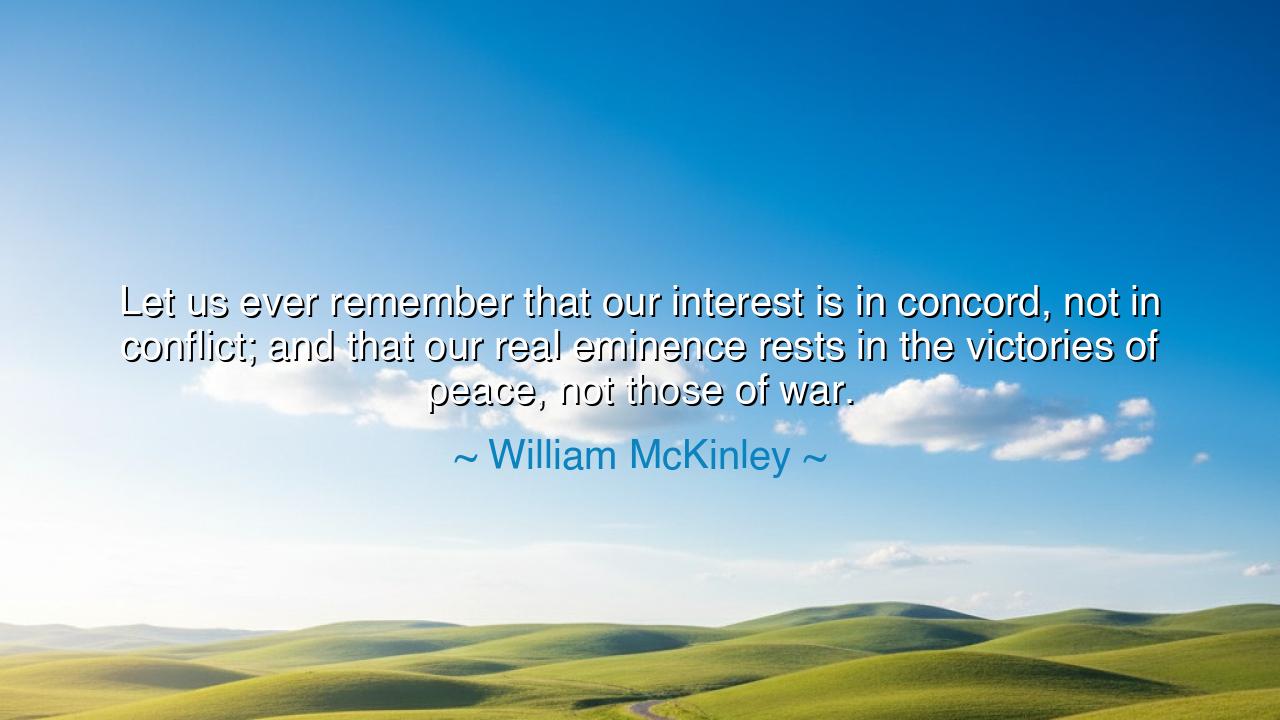
Let us ever remember that our interest is in concord, not in
Let us ever remember that our interest is in concord, not in conflict; and that our real eminence rests in the victories of peace, not those of war.






Hear, O seekers of wisdom, the words of William McKinley, spoken like a solemn vow to his people: “Let us ever remember that our interest is in concord, not in conflict; and that our real eminence rests in the victories of peace, not those of war.” These words shine like a beacon across the storms of history, reminding us that the greatness of nations is not measured by the ruins they leave behind in conquest, but by the harmony they build, the justice they uphold, and the peace they preserve for generations yet unborn.
The origin of these words comes from McKinley’s presidency at the end of the 19th century, a time when America was rising in power and ambition. The temptation for conflict was strong, as nations competed for colonies and influence. Yet McKinley, reflecting on the true purpose of national strength, urged his people to remember that concord, not conflict, must guide their path. For he knew that the “victories of war,” however glorious they seemed in the moment, were fleeting, while the victories of peace endured as the foundation of civilization itself.
The ancients understood this truth. The philosophers of Greece taught that harmony within the city was greater than triumph over enemies abroad. Rome, in its days of wisdom, declared that peace, the Pax Romana, was the highest fruit of order, greater even than military glory. And in the East, Confucius taught that the noble ruler governs not by the sword, but by virtue, cultivating peace that spreads like a gentle rain across the land. McKinley’s voice echoes these eternal lessons, calling his people away from the intoxication of conflict toward the higher victories of reconciliation.
History offers us powerful examples. Consider the Congress of Vienna after the Napoleonic Wars. Europe, long drenched in blood, could have chosen vengeance and endless division. Yet the victors sought instead a fragile concord, building a balance of power that, though imperfect, preserved peace across the continent for decades. Their true greatness was not in defeating Napoleon alone, but in forging a peace that allowed nations to rebuild. Likewise, when leaders choose concord over conflict, they craft legacies of stability far more lasting than any battlefield triumph.
Yet beware, O listener, for the world often glorifies the clash of arms and crowns generals with honor, while the quiet laborers of peace are forgotten. War parades are loud, but the silent victories of peace—treaties signed, disputes resolved, bridges built between former foes—are the true foundations of human greatness. McKinley’s warning is for all ages: do not mistake noise for glory, nor conquest for true eminence. It is in the still strength of peace that a nation proves its worth.
The lesson is clear: the measure of your greatness is not in how fiercely you can fight, but in how faithfully you can preserve harmony. This is true for nations, but also for individuals. To win an argument may bring pride, but to preserve friendship brings lasting strength. To crush an enemy may feed the ego, but to reconcile with him enriches the soul. Victories of peace are harder, requiring patience, forgiveness, and humility—but they endure when the smoke of battle has long vanished.
Practical wisdom flows from this teaching. In your life, choose concord over conflict whenever possible. Resolve disputes with fairness, seek understanding before anger, and strive always to leave behind harmony, not bitterness. In your community, work not to dominate but to unite. And as citizens, support leaders who build peace rather than glorify war. For every action that nurtures concord is a brick laid in the temple of peace, and every heart that chooses harmony becomes a guardian of civilization.
So remember the words of William McKinley: our real eminence rests in the victories of peace, not those of war. Let this truth echo in your heart, and let it guide your steps. For the world is ever tempted by conflict, but only those who labor for peace achieve greatness that time cannot erase. To win by the sword is to triumph for a season, but to win by peace is to triumph for eternity.






AAdministratorAdministrator
Welcome, honored guests. Please leave a comment, we will respond soon